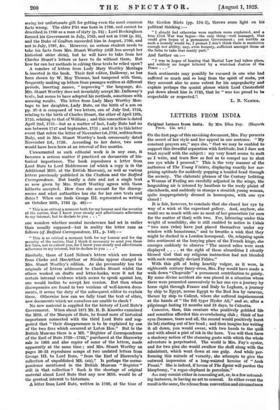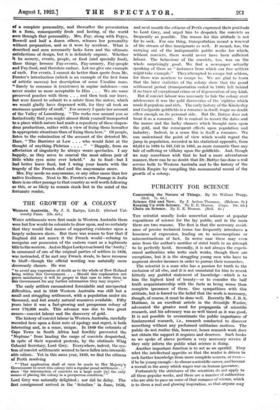LETTERS FROM INDIA
ON the first page of this ravishing document, Mrs. Fay presents the secret of her style and her appeal in one sentence. "My constant prayers are," says she, "that we may be enabled to support this dreadful separation with fortitude, but I dare not trust myself with the subject : my very heart seems to melt as I write, and tears flow so fast as to compel me to shut one eye while I proceed." This is the very manner of the authoress of The Young Visiters, displaying exactly her sur- prising aptitude for suddenly popping a touzled head through the scenery. The elaborate phrases of the Century befitting a Woman of Feeling are carefully adjusted in the wings, the languishing air is intoned by hautbois to the reedy plaint of clavichords, and suddenly in stumps a stoutish young woman, quite inappropriately dressed in homespuns, with one eye closed !
It is fair, however, to conclude that she closed her eye by way of a wink at the expectant gallery. And, anyhow, she could see as much with one as most of her generation (or ours for the matter of that) with two. For, labouring under this weight of sensibility, she is still enabled to notice in Calais "two men (who) have just placed themselves under my window with hmnstriuns," and to breathe a wish that they /night be ducked in a London horsepond. Or, relapsing again into sentiment at the burying place of the French kings, she emerges suddenly to observe "The sacred relics were next displayed • . . . at the sight of these absurdities I silently blessed God that my religious instruction had not blended with such cunningly devised Fables."
With this gift of being heartily vulgar, as it were, in eighteenth century fancy-dress, Mrs. Fay would have made a walk down " Chepeside" a permanent contribution to gaiety. By some divine accident she was placed in a situation where there were presented successively to her one eye a journey by horse right through France and Italy to Leghorn, a journey by ship to Egypt, across Egypt to the Red Sea by caravan, thence by ship to Calicut, where she suffered imprisonment at the hands of "the fell tyger Hyder Ali," and so, after a pilgrimage lasting 12 months and 18 days, to Calcutta.
Conceive, then, this creature who positively gobbled life and sensation afforded this overwhelming dish ; think of her eyes (because, tears and all, the second would positively burst its lid) starting out of her head ; and then imagine her writing it all down, you would swear, with two hands to the quill and with about a pint of ink in the horn. You will then have a shadowy notion of the stunning gusto with which the whole adventure is perpetuated. The world is Mrs. Fay's oyster, and for two pins she would swallow the shell along with the inhabitant, which went down at one gulp. And while per- forming this miracle of voracity, she attempts to give the outward impression of a long-waisted heroine of "Arch Piozzi." She is indeed, if lovers of The Egoist will pardon the blasphemy, "a rogue-elephant in porcelain."
Arc may consist either in concealing art, or, in a few astound- ing instances, in having no art to conceal. In either event the result is the same, the release from convention and circumstance
of a complete personality, and thereafter the presentation in a form, consequently fresh and lasting, of the world seen through that personality. Mrs. Fay, along with Pepys, Boswell and half a dozen others, releases her personality without preparation, and as it were by accident. What is described and seen necessarily lacks form and the ultimate satisfactions of design, but it is definitely organic. Whether it be scenery, events, people, or food (and specially food), these things become Fay-events, Fay-scenery, Fay-people and Fay-food, and therefore endure. Let me give one example of each. For events, I cannot do better than quote from Mr. Forster's introduction (which is an example of the first form of artistic success) her description of some Ursuline nuns. "Surely to consume it (existence) in supine indolence—can never render us more acceptable to Him . . . We ate some preserved peaches with them . . . and then took our leave, but were forced to submit to a salute from the sisters, which we would gladly have dispensed with, for they all took an enormous quantity of snuff." For scenery I quote her account of the Valley of Lanenburg. "The rocks rose around you so fantastically that you might almost think yourself transported to a place which nature had made a repository of these stupen- dous productions, rather with a view of fixing them hereafter In appropriate situations than of fixing them here." Of people, listen to the culmination of the account of the detested Mr. Hare, "The Barrister at Law. . . who would faint at the thought of anything Plebeian. . . . " "Happily, from an affectation of singularity he always wears spectacles. I say happily, as they serve to conceal the most odious pair of little white eyes mine ever beheld." As to food—but I had better leave food, lest I wring your hearts with the tragedy of the French chef and the mayonnaise sauce.
Mrs. Fay needs no mayonnaise, or any other sauce than her native liveliness. Next to Mr. Forster's own Passage to India there is no other passage to that country as well worth following as this, or as likely to remain stuck fast in the mind of the fortunate reader.







































 Previous page
Previous page